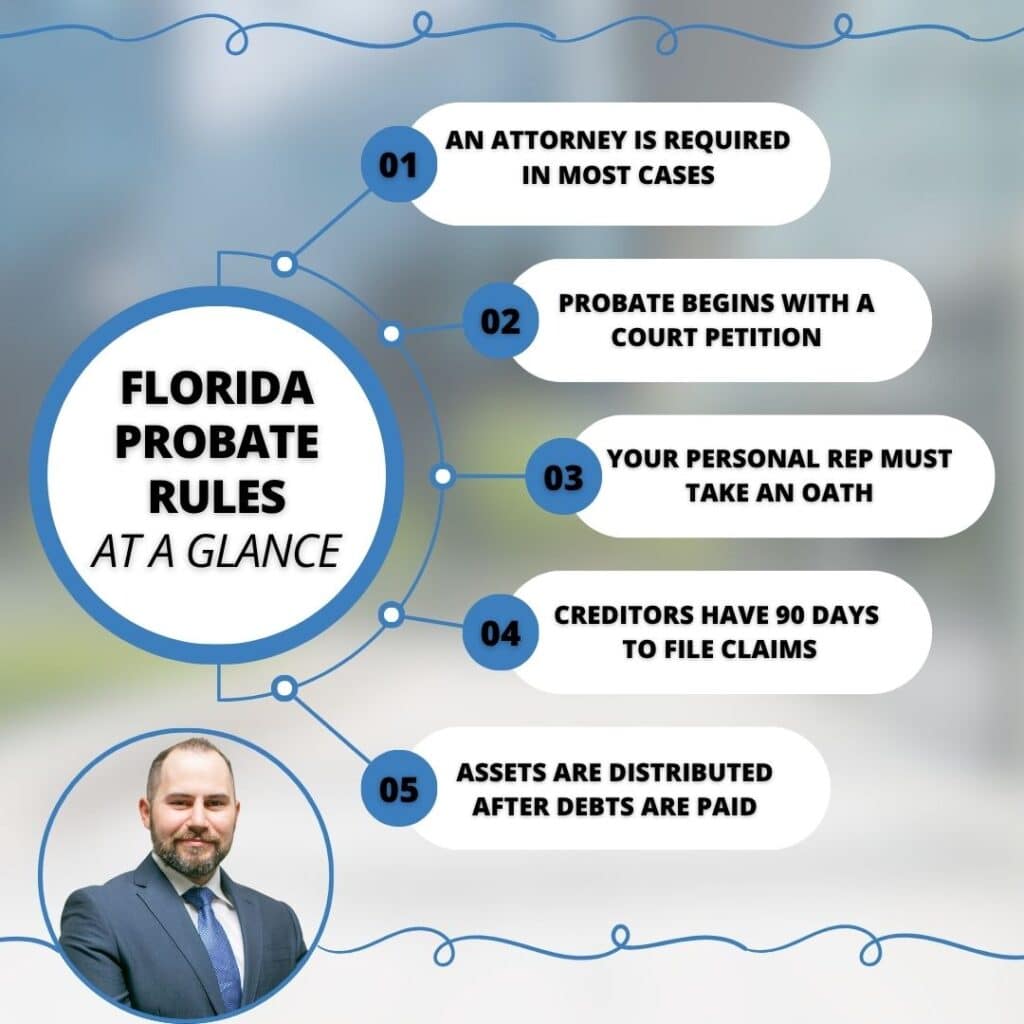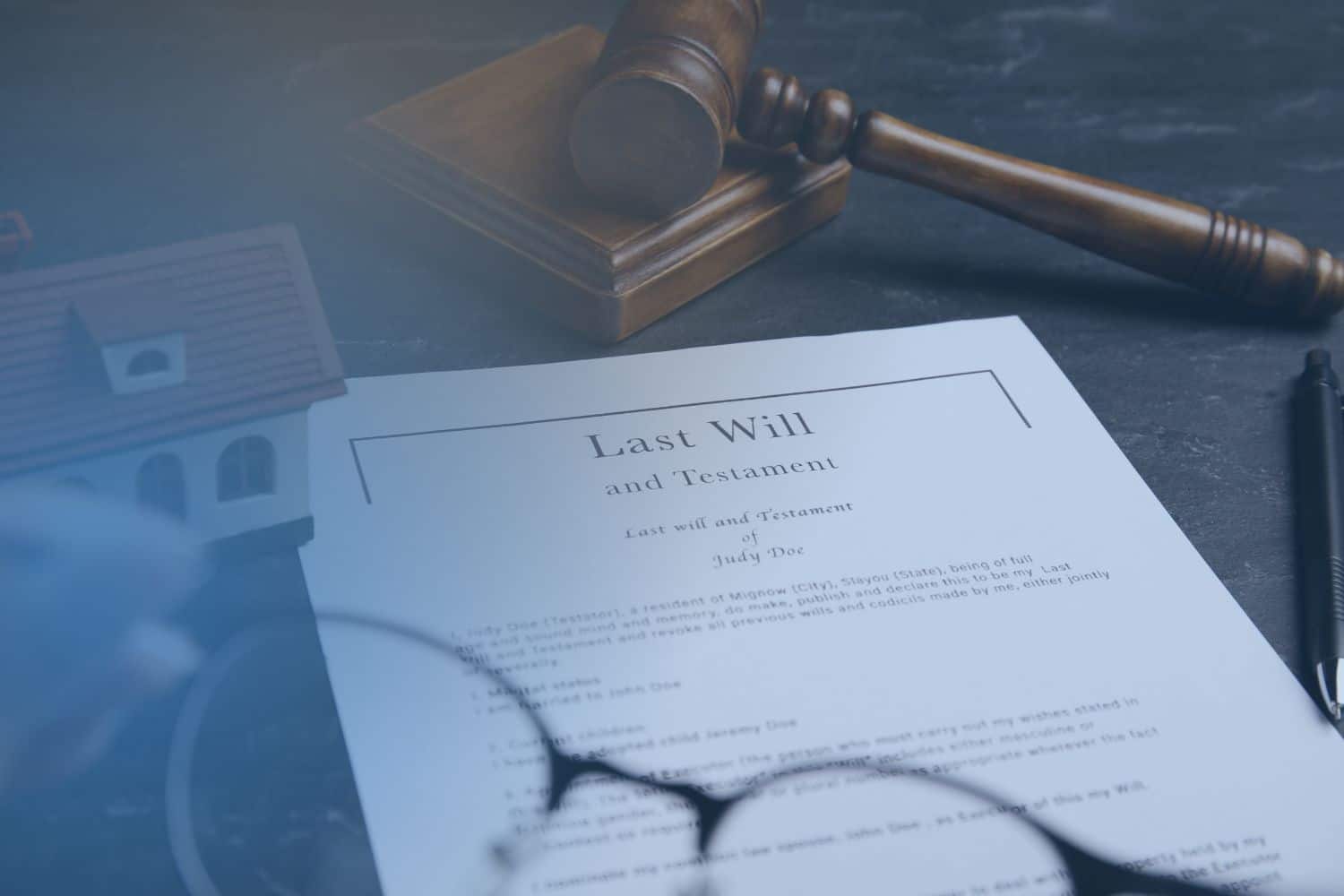When someone passes away, families often face two challenges at once: grief and legal responsibilities. In Florida, most estates must go through probate, the court’s process and rules for handling a person’s property, debts, and final wishes.
Probate can sound complicated, but rest assured, it’s clearer than it first appears.
This guide explains Florida probate rules in simple terms, what they mean for your family, and how you can plan ahead to avoid unnecessary delays or costs.
What Probate Means in Florida
Probate is the legal process that takes place after someone dies. It ensures that…
- A will is validated (if one exists)
- A personal representative (sometimes called an executor) is appointed
- All assets are identified and valued
- Creditors and taxes are paid. The remaining property is distributed to the beneficiaries
Florida probate rules are designed to make sure estates are handled fairly and according to state law. Without probate, there would be no official way to transfer ownership or resolve disputes.
When Probate Is Required
Probate in Florida is required when:
- The deceased owned assets in their name alone (with no joint owner or beneficiary listed)
- Real estate must be transferred to heirs
- Creditors need to be notified and paid from the estate
On the other hand, probate may not be required if assets pass directly to someone else. For example:
- Life insurance and retirement accounts with listed beneficiaries
- Bank accounts with “payable on death” designations
- Jointly owned property with rights of survivorship
Knowing what does and doesn’t go through probate is one of the first questions families ask!
About 60% of Americans do not have a will or estate plan, meaning probate is often required
Types of Probate in Florida
1. Formal Administration
The standard process for estates worth more than $75,000 or when court supervision is needed.
It involves petitions, notices to creditors, inventories, and final distributions. Because it is detailed, it often takes months to complete.
2. Summary Administration
A faster option for smaller estates under $75,000 or when the decedent has been deceased for more than two years. Families often ask about this process because it reduces both time and cost.
3. Disposition Without Administration
The simplest option, available only when the estate is made up of exempt property or funds used to cover final expenses.
This does not apply in most cases, but it can help when a person leaves little behind.
4. Ancillary Administration
If someone whose domicile is located outside the state of Florida passes away and owns real property in Florida, you will be required to file an Ancillary probate to settle any issues regarding the real property located in Florida.
When this happens, two probates are necessary, one in the home state (domicile state) and one in Florida.
This is also true if a person’s home state is Florida and has property elsewhere. An ancillary probate will need to be commenced in that other state more likely than not.

How Long Does Probate Take?
Time is one of the biggest concerns families have. Here’s a quick overview considering regional details:
- Formal administration often takes 6 to 12 months, though complicated estates can take longer.
- Summary administration may take only a few weeks to a few months, depending on the court’s schedule.
According to AARP, probate nationwide averages 9 months to a year, which means Florida timelines are typical compared to other states.
At Dill Evans and Rhodeback, our team strives to complete formal administrations as soon as possible. Most formal probates in our office conclude within 6-8 months.
Costs to Prepare For
Every probate case has some costs, but Florida law provides clear guidelines to keep things fair and consistent. Typical expenses may include court filing fees, attorney’s fees, and compensation for the personal representative.
Larger or more complex estates may also require appraisals or accounting services. The good news is that many estates follow standard fee schedules, and costs are generally predictable once the estate’s value and complexity are known.
For smaller estates, summary administration is usually faster and less expensive.
Our probate attorney and staff can explain An attorney can explain which costs apply to your situation, help minimize unnecessary expenses, and guide you through the process so there are no surprises.
Common Challenges
Even though the rules are clear, families often encounter:
- Disagreements about the validity of a will
- Conflicts among heirs over property or money
- Delays due to missing documents or unclear instructions
- Confusion over creditor claims
The National Association of Realtors found that one in five real estate transactions is delayed by probate issues when property ownership is unclear.
This makes planning and proper documentation critical.
Ways to Avoid or Simplify Probate
Estate planning can reduce or even eliminate the need for probate. Common strategies include:
- Living trusts: Assets in a trust pass directly to beneficiaries without probate.
- Joint ownership: Property owned jointly transfers automatically to the surviving owner.
- Beneficiary designations: Life insurance, retirement accounts, and payable-on-death bank accounts transfer without probate.
- Up-to-date wills: A current, valid will helps avoid disputes and makes probate smoother.
Families who plan ahead spend less time and money in court later. With the help of an estate planning attorney, probate may be able to be avoided completely.
Make sure to call and set an appointment with one of our attorneys to discuss your current estate plan or create yours today. Failure to prepare is preparing to fail. Do not let your family be in the unknown and struggling to put the pieces together after a loved one passes away.
Other Related Questions
What legal issues do small business owners often face?
Common challenges include drafting clear contracts, handling employment matters, and planning for succession. Having the right legal guidance early can prevent costly disputes later.
Can estate or property disputes end up in court?
Yes. If families or co-owners cannot agree, litigation may be required. Courts help resolve conflicts over wills, contracts, or property rights, but strong legal representation is key to protecting your interests.
Why involve an attorney in real estate transactions?
Real estate deals can uncover title issues, unclear contracts, or boundary disputes. An attorney reviews documents, resolves problems, and ensures the transfer is legally sound, reducing the risk of delays or future claims.
When to Call a Professional
Probate involves strict rules, paperwork, and deadlines. Trying to handle it alone can be stressful and confusing. That’s why Florida law requires attorney involvement in most cases.
At Dill, Evans, & Rhodeback, we help families navigate probate with clarity and compassion. We also work with clients on estate planning, wills, trusts, and guardianships to prevent problems before they arise.
Conclusion
Florida probate rules are designed to make sure estates are settled fairly, but the process is not always simple. Understanding the basics helps, but professional guidance ensures everything is handled correctly and on time.
If you need help with probate or want to create an estate plan that makes things easier for your family, contact Dill, Evans, & Rhodeback today.
Schedule a consultation today, and let our attorneys guide you through every step with straightforward advice you can trust.


